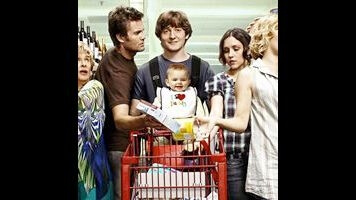Raising Hope: "Para-Natesville Activity"

“Para-Natesville Activity” benefits from appearances by two friends of the show: Mike O’Malley as Jimmy, the guy who learned to show greater consideration for his wife from watching Virginia and Burt’s homemade sex tape, and Eddie Steeples as the jack-of-all-trades Tyler. Tonight, Tyler is brought in to conduct a séance, though he protests that communing with the dead has long since gone on the ash heap of his previous occupations, along with renting VHS tapes and teaching people how to dance the Macarena. Having had a bad run-in with his dead grandmother—“She was annoying when she was alive, but she’s downright unbearable as a spectral being.”—he prefers to make a few bucks by doing such chores as delivering pizzas, or writing people’s names on a grain of rice. The Chances have a serious poltergeist situation, though, so he agrees to help. He, Virginia, and Burt link hands around the table, and all hell breaks loose: Scary moaning sounds are heard, the lights begin to flicker, and then Burt, his eyes rolling up in his head and his mouth hanging open, throws himself on the bed and flails about, clearly in the throes of demonic possession. Virginia begs Tyler to do something. Thinking quickly, Tyler points at Burt and asks, “Do you want your name on a piece of rice!?”
But I’m getting ahead of myself. At its core, this episode isn’t about ghosts or what passes for a job market these days. It’s about what, in a spirit of generosity inspired by the show’s own generous spirit, I will call Virginia’s crisis of faith. Virginia, who has always been so happy to believe any ridiculous thing that anybody tells her, has been pushed too far by a documentary, purporting to prove that mermaids are real, that she watched on “that channel where you’re supposed to learn stuff.” Having believed the show’s Jude Law-narrated lies, imagine how mortified she is when Frank, of all people, tells her that the mermaid story is a crock. The network has already issued an apology, which reads, “We never would have aired the film if we’d known there were people stupid enough to fall for it.” If Fox News had that continuously running on a crawl at the bottom of the screen, it would count as a step in the right direction.
Virginia feels so conned that she smashes her prized pigurines, starting with her previous Pigfoot, denouncing it as “a ceramic lie,” and prepares to throw out her telescope, which she sees as useless now that she knows there are no UFOs to watch out for. But this is not a Flowers For Algernon moment. Readjusting her thought process so that it’s lined up with reality doesn’t liberate Virginia from the chains of delusional thinking and ignorance. It just bums her out. Burt, naturally, takes it harder than anyone. “I miss the woman who believed pigs could be policemen or lawyers or porktologists,” he says, and even tries to piece Pigfoot back together before becoming dejected himself. (“Now I see why God never actually made a pig Sasquatch. It’s very time-consuming!”) So when objects in the house begin moving of their own accord and Maw-Maw’s closet appears to be haunted, it’s actually a cause for rejoicing.
Burt’s rejoicing grows a little muted when he discovers that the Chances don’t have a ghost, but a friendly home invader. It’s Jimmy, who, having run into some problems at home, has come to the Chance’s house hoping to ask their advice and, instead, has somehow moved into the fallout shelter that Burt didn’t even know they had. (“It’s really small,” he notes when he finally checks out the space. “I don’t think Paw-Paw was planning to save the whole family.”) So that’s how Mike O’Malley winds up hiding beneath the floorboards, banging on the pipes and moaning and belching (“It’s the restless spirits of the Native American children buried beneath the house!” cries Burt. “There’s nothing scarier than the burp of a dead child!”), to restore Virginia’s sense of wonder. I’m not sure why, after having spent half my life hating Forrest Gump, I was rooting for this mission to succeed, but take my word for it: Martha Plimpton and Garret Dillahunt make a more convincing case for the argument that being not-so-bright may be a state of grace than Tom Hanks ever did. There’s also a twist ending, which, weirdly enough, which actually makes the whole thing that much endearing. In its final installments, Raising Hope has fully regained its knack for merging deep sweetness with high silliness. If that doesn’t restore your sense of wonder, I don’t know what will.